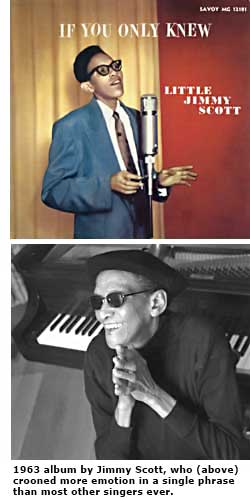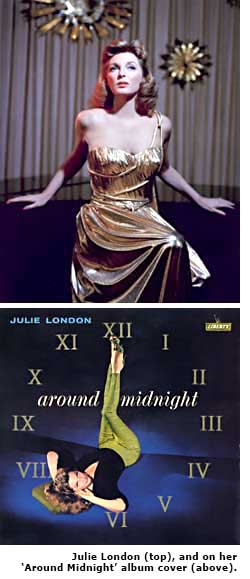Mood to be Wooed - Classic Crooners - Page 3
So it shouldn't come as a surprise that Scott prefers ballads to up-tempo numbers. However, not all his songs are as wrenching as 'Sometimes I Feel Like a Motherless Child,' which evokes for him thoughts of his mother Justine, who died when Scott was 13. His song lists include many of the odes to love you'd expect from a crooner, such as 'All or Nothing at All' (from his 1955 album 'If You Only Knew'), 'I Cried For You,' and 'Embraceable You,' the last of which he dedicates to Jeanie as "the song that got me married." Scott makes his way through 'Day By Day' more like it was minute by minute, perhaps too slow and emotionally saturated for some tastes.
Aside from differences in singers' vocal and dramatic approach to their craft, there's much variety in repertoire, both in recordings and live performances. It's not all crooning, and oftentimes song selection was not a singer's choice. "When I first started, in the '40s, I had to do some songs I didn't care for," the late Etta Jones said in 1993. "But now I more or less sing what I want to sing...And my songs—I want a good lyric, I don't want nonsense. I like heavy dramatic tunes, usually, a tune that's saying something, that's not 'moon in June.'"

Like Jimmy Scott, Jones singled out 'All the Way,' with lyrics by Sammy Cahn, "who was one of my favorite writers, if not the favorite writer." She supported her preference with a quote from Cahn's heart-tugging lyric: "When somebody loves you, it's no good unless he loves you—all the way."
Love sought, won, struggled over, and lost is of course the most likely subject for crooning, but not the only one. Consider what's arguably Tony Bennett's most successful paean, to the city of San Francisco. "['I Left My Heart in San Francisco'] is a song everybody loves," Bennett rightly claims. "Like in the days of Vietnam, I'll never forget what it said in the 'New York Times': when they [the soldiers] were sitting around the fire waiting for planes to bring them home, they were all singing, 'San Francisco.'"
Along with love—and San Francisco—crooning and its repertoire never really disappeared. Bobby Darin, a protean performer with rock 'n' roll hits, extended himself and crooning into the '60s, working with big band jazz arrangements and recording in a voice and style that seemed to variously channel Sinatra and Bennett. The '90s brought a new crop of singers, similarly inclined to explore more than one genre, including mid-century crooning. They included John Pizzarelli, k.d. lang, Diana Kraal, Michael Bublé, Harry Connick, Jr., and Peter Cincotti.
"It's a more mature kind of young people coming up that plays piano and has a good musicality, so that's encouraging," says Bennett. "They all have great potential, all of them. But the only trouble is that they don't have that vaudeville training. They haven't learned about the craft and singing properly." Bennett and Scott have tried recording newer songs, but don't find as much to like. "I'd say music back then [in the mid-century] was much better for my style of singing," says Scott. "You could understand what [the songs] meant. Now you don't know half of what they're saying. The music goes nowhere and I don't think it reaches the musicians, especially the young musicians, like our music reached us in our day. There's no unity, no harmony—they have lost respect for the design of music. And that's sad."

But there's enough good music out there to support an ongoing crooning renaissance of sorts, from which Scott, Bennett, and fans of all ages have benefitted. Both men have issued an impressive number of new and reissued albums over the past two decades, and have toured widely, sharing stages and studio time with several young singers. Bennett also, with funding from the city of New York, founded the Frank Sinatra School of the Arts, named for his fellow crooner and including jazz vocal training in its curriculum.
Despite the glut of extraneous information and unartful entertainment in the new millennium, and maybe because of them, there's a lingering desire among many of us to be crooned to, to take the time to listen, and to love. Thanks to a few sensitive folks in the entertainment industry, there are still tender tracks to follow.
Both Jimmy Scott and Tony Bennett certainly believe that audiences are still able to hear with their hearts, and that singers should keep crooning to them. "I'm more passionate about it and more disciplined about it than ever," Bennett points out. "They're beginning to understand what I'm trying to say in a song," Scott chimes in, "and that inspires me and makes me want to do more."




